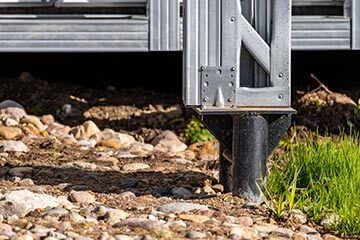Ever stared at your home insurance quote and thought, 'What on earth is an excess? You're not alone - it sounds more complicated than it is.
In short, it's the amount you chip in towards a claim before your insurer covers the rest.
There are 2 types: compulsory (set by your insurer) and voluntary (you choose this bit). Balancing them is the key to a lower premium, and we'll show you how.

What does 'excess' mean on home insurance?
Your excess is the amount you'll need to cover yourself if you make a claim on your home insurance.
There are 2 types of excess:
When paying this excess, you don't give cash to your insurance company. Instead, your insurer deducts this amount from your total payout and sends you the rest.
So if you've got an excess of £250 and make a claim for accidental damage worth £1,000, your insurer keeps the first £250 and gives you £750.
One more thing: buildings and contents cover each have their own excess. Even if they're bundled under one policy, they're treated separately.
What’s the difference between voluntary and compulsory excess?
Here's how they work:
Voluntary excess
This one's optional - you can choose how much you're happy to pay on top. Most insurers let you set it between £0 and £400.
The more you're willing to pay, the lower your premium might be. That's because your insurer will pay out less if you claim.
Compulsory excess
This bit's set by your insurer, and you don't get a say in it. It's usually around £100-£150 but can be higher depending on the cover.
Example:
Let's say your compulsory excess is £150. If you also choose a voluntary excess of £250, you'd have to cover £400 total before your insurer chips in.
When do you pay excess on home insurance?
You'll only need to pay your excess when you make a claim.
The amount depends on your policy and what you're claiming for.
For example:
-
If you have accidental damage cover as part of your contents insurance policy, your compulsory excess might be higher.
-
On buildings insurance cover, the excess for subsidence claims is usually much bigger - usually around £1,000 - because they tend to cost more to sort out.
Is it always worth claiming?
Not always. If the payout's small, it might not be worth it once your excess is taken off.
Plus, making a claim could affect your no-claims discount. So if it's something minor, it might be better to cover the cost yourself.
Do I always have to pay an excess when I claim?
If your insurer pays out, yes - your excess will be deducted from the total amount. That's why it's worth doing a quick 'is it worth it?' check before you go ahead with the claim.
There is one exception:
If the total cost of the damage is less than your excess, you won't get anything back, and you'll need to cover it yourself.
Example:
Say your total excess is £250, but a storm causes £200 worth of damage to your shed roof. You wouldn't get a payout, so you'd need to pay the full cost yourself.
If the total cost of the damage is less than your excess, you won't get anything back, and you'll need to cover it yourself.
How much voluntary excess should I pay on my home insurance?
It's totally up to you - just make sure it's an amount you could comfortably afford if you ever need to claim.
What do most people do?
It's helpful to see what others choose. We looked at our data, and the most common amount of excess is £250*.
-
60% of policies have £250 set for buildings excess
-
38% of policies have £250 set for contents excess
Finding what works for you
Choosing a higher voluntary excess can lower your premium, but it only works in your favour if you don't end up claiming.
A good rule? Keep your excess lower than what you'd expect to claim for.
Let's say your laptop is worth £500, and your compulsory excess is £100. To make a claim worthwhile, your voluntary excess would need to be less than £400 - or you'd be better off covering the cost yourself.
Is there a minimum excess on home insurance?
Yes, the absolute minimum you'll pay is the compulsory excess set by your insurer. You don't get to choose this, it's just part of the policy.
But when it comes to the voluntary excess (the bit you add on top), you've usually got more flexibility - sometimes you can go as low as £0.
When you're comparing quotes with us, you'll often be able to pick from options like:
-
£0
-
£150
-
£250
-
£400
And you'll always see the compulsory and voluntary excess amounts shown clearly under the price, so there are no surprises.
Does having a higher excess reduce my home insurance costs?
Generally yes, and it's a handy way to bring your premium down a bit.
We've had a look at our data. The average annual cost of buildings insurance where the excess is set to £250 is £176.75*. But with a £0 excess, that jumps to £193.92.
It's similar with contents insurance - a £250 excess brings the average to £57.37, while a £0 excess bumps it up to around £66.80.
When you're getting a quote, you can play around with your voluntary excess and see how the price changes. The key is choosing an amount that helps you save now without leaving yourself short if you ever need to make a claim.
What our home insurance expert says
“A higher voluntary home insurance excess indicates to your insurer that you're less likely to make a home insurance claim for something small. And even if you do make a claim, your insurer has to pay out less. This reduces your risk of making a claim at all, often giving you lower home insurance costs.”

How else can I reduce the cost of my insurance?
Here are some other ways to manage the cost of your cover:
-
Pay annually - monthly payments usually come with added interest, so paying once a year can work out cheaper.
-
Install security devices - fitting things like burglar alarms or smart cameras might help lower your premium by reducing the risk of break-ins.
-
Maintain your house - a well-looked-after home is less likely to suffer from things like storm damage and wear and tear.
-
Don't over insure - knowing just how much cover you need for your contents insurance can prevent you from paying more than you need to.
-
Build up a no-claims discount - every year you go without making a claim helps show insurers you're low risk, and that can mean lower prices.
*Confused.com data. June 2023 - June 2025








